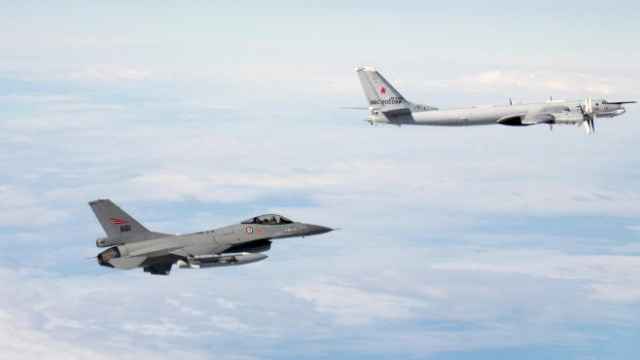President Vladimir Putin said a recent flurry of Russian strategic bomber patrols near NATO airspace was a response to U.S. insistence on flying nuclear bombers along Russia's borders.
Amid rising international tensions over the conflict in eastern Ukraine, Putin also stressed that Russia's bombers have not violated foreign airspace: "Our exercises are exclusively conducted in international waters and international airspace," Putin said in an interview with Germany's ARD television on Sunday, according to a transcript on the Kremlin's website.
In late October, NATO officials flagged an unusual number of sorties by Russia's giant Tu-95 strategic bombers following provocative flight routes over the Atlantic Ocean and North Sea.
While the alliance has reported Russian fighters violating the airspace of several member nations in the Baltic region and Eastern Europe in recent months, it has not accused Russian bombers of entering NATO territory.
Putin said the expansion of Russia's bomber patrols is a return to a Cold War norm that the U.S. never abandoned.
The Soviet Union regularly deployed their Tu-95 bombers during the Cold War in a bid to achieve parity with the U.S.'s far-larger fleet of B-52 bombers, but essentially grounded its air force when the Soviet Union collapsed.
"Meanwhile, our U.S. partners continued to fly their nuclear aircraft along their previous routes, including to areas close to our borders. Therefore several years ago, seeing no positive developments and no one ready to meet us halfway, we resumed strategic air patrols to remote areas," Putin said.
Russia first renewed strategic nuclear bomber patrols and exercises in 2007, but has ramped up activity in recent months as relations with the West have soured over Ukraine.
A Message from The Moscow Times:
Dear readers,
We are facing unprecedented challenges. Russia's Prosecutor General's Office has designated The Moscow Times as an "undesirable" organization, criminalizing our work and putting our staff at risk of prosecution. This follows our earlier unjust labeling as a "foreign agent."
These actions are direct attempts to silence independent journalism in Russia. The authorities claim our work "discredits the decisions of the Russian leadership." We see things differently: we strive to provide accurate, unbiased reporting on Russia.
We, the journalists of The Moscow Times, refuse to be silenced. But to continue our work, we need your help.
Your support, no matter how small, makes a world of difference. If you can, please support us monthly starting from just $2. It's quick to set up, and every contribution makes a significant impact.
By supporting The Moscow Times, you're defending open, independent journalism in the face of repression. Thank you for standing with us.
Remind me later.





